Studios de Babelsberg

If you like this company, let us know!
Foundation date 1 january 1911
Les studios de Babelsberg sont des studios de cinéma fondés en 1911 et situés dans la banlieue de Berlin à Potsdam (dans la localité homonyme). Ils deviennent rapidement un des centres mondiaux de la production cinématographique tant par le nombre de films tournés que par la qualité des réalisations. Mais la période nazie sonne le glas de la créativité des studios. Après une longue période d'assoupissement pendant la période est-allemande, les studios Babelsberg ont retrouvé un rayonnement international.
Best films
Filmography of Studios de Babelsberg (57 films)
Distribution
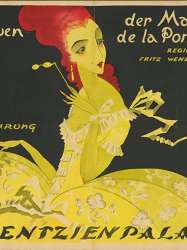
Directed by Fritz Wendhausen
Origin German
Genres Comedy-drama
Actors Olga Gzovskaïa, Alfred Abel, Paul Hartmann

Phantom (1922)
, 2h25Directed by Friedrich Wilhelm Murnau
Origin USA
Genres Drama, Fantasy, Romance
Actors Alfred Abel, Lil Dagover, Lya De Putti, Anton Edthofer, Aud Egede-Nissen, Hans Heinrich von Twardowski
The film is told in an extended flashback. Lorenz Lubota (Alfred Abel), is a clerk in a minor government office, an aspiring poet, and a member of a family headed by a worrisome mother who has a tense relationship with a daughter, Melanie, whom the mother believes works as a prostitute. One day, while Lorenz is walking to work, a woman (Lya De Putti) driving two white horses hits him in the road, knocking him to the ground. Physically, he is unharmed, but from that point forward, the woman in the carriage (named Veronika) consumes his every thought.

Playing with fire (1921)
Directed by Robert Wiene
Genres Drama
Actors Diana Karenne, Ossip Runitsch, Anton Edthofer
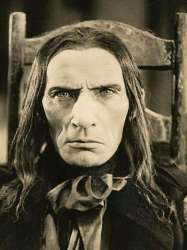
The Black Panther (1921)
Directed by Johannes Guter
Genres Drama
Themes Films based on plays
Actors Wilhelm Diegelmann, Eugen Burg, Friedrich Kühne
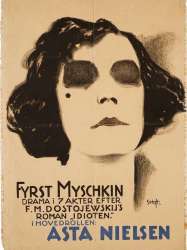
Wandering Souls (1921)
Genres Drama
Actors Asta Nielsen, Alfred Abel, Walter Janssen, Ernst Rotmund, Auguste Prasch-Grevenberg, Frida Richard

Destiny (1921)
, 1h40Directed by Fritz Lang
Origin German
Genres Drama, Thriller, Fantasy, Romance
Themes Time travel films
Actors Lil Dagover, Walter Janssen, Bernhard Goetzke, Rudolf Klein-Rogge, Eduard von Winterstein, Max Adalbert
In the Expressionistic frame story, in which human lives are each represented by a candle, Death grants a woman three chances to save her lover, if love can triumph over death. The three stories within the story each occur in a setting that is nominally historic, but really in the realm of fantasy: an adventure tale with a Persian setting out of the Arabian Nights, a Renaissance Venetian romance, and a largely comic story set in China.
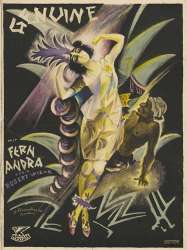 , 44minutes
, 44minutesDirected by Robert Wiene
Origin German
Genres Horror
Actors Fern Andra, Hans Heinrich von Twardowski, Ernst Gronau, John Gottowt, Louis Brody
Since completing a portrait of Genuine, a high priestess, Percy becomes irritable and withdrawn. He loses interest in painting and refuses to see his friends, preferring to spend his time alone with the portrait in his study. After turning down a wealthy patron's offer to buy the picture, Percy falls asleep while reading stories of Genuine's life. Genuine comes to life from the painting and escapes.
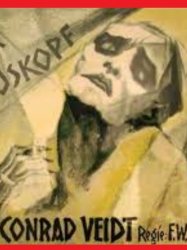
The Head of Janus (1920)
, 1h47Directed by Friedrich Wilhelm Murnau
Genres Science fiction, Horror
Actors Conrad Veidt, Magnus Stifter, Bela Lugosi, Willy Kaiser-Heyl, Margarete Kupfer, Gustav Botz
Conrad Veidt plays Dr. Warren (the Dr. Jekyll character) who changes into Mr. O'Connor (a parallel of Mr. Hyde). This transformation is brought about, not by experimentation with chemicals as in Stevenson's original, but through the supernatural agency of a bust of Janus (the Roman god of the doorway), which Warren / O'Connor purchases in the opening sequence as a gift for his sweetheart, Jane Lanyon (Margarete Schlegel). When she refuses the gift, horrified, Warren / O'Connor is forced to keep the statuette himself.

Figures of the Night (1920)
Directed by Richard Oswald
Genres Drama, Horror
Actors Paul Wegener, Erna Morena, Conrad Veidt, Erik Charell, Anita Berber, Paul Bildt

The Cabinet of Dr. Caligari (1920)
, 1h11Directed by Robert Wiene
Origin German
Genres Drama, Thriller, Fantastic, Horror, Crime
Themes Circus films, Medical-themed films, Psychologie, Serial killer films, Films about psychiatry, Films set in psychiatric hospitals
Actors Werner Krauss, Conrad Veidt, Lil Dagover, Hans Heinrich von Twardowski, Friedrich Feher, Rudolf Klein-Rogge
As Francis (Friedrich Feher) sits on a bench with an older man who complains that spirits have driven him away from his family and home, a dazed woman named Jane (Lil Dagover) passes them. Francis explains she is his "fiancée" and that they have suffered a great ordeal. Most of the rest of the film is a flashback of Francis' story, which takes place in Holstenwall, a shadowy village of twisted buildings and spiraling streets. Francis and his friend Alan (Hans Heinrich von Twardowski), who are good-naturedly competing for Jane's affections, plan to visit the town fair. Meanwhile, a mysterious man named Dr. Caligari (Werner Krauss) seeks a permit from the rude town clerk to present a spectacle at the fair, which features a somnambulist named Cesare (Conrad Veidt). The clerk mocks and berates Dr. Caligari, but ultimately approves the permit. That night, the clerk is found stabbed to death in his bed.
 , 1h21
, 1h21Directed by Fritz Lang
Origin German
Genres Adventure, Crime
Actors Carl de Vogt, Georg John, Lil Dagover, Harry Frank, Paul Morgan, Paul Biensfeldt
Part 1. Der goldene See (actually The Golden Lake but known as The Golden Sea):
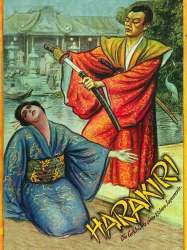
Harakiri (1919)
, 1h20Directed by Fritz Lang
Origin German
Genres Drama
Themes Seafaring films, Théâtre, Transport films, Films based on plays
Actors Lil Dagover, Paul Biensfeldt, Georg John, Meinhart Maur, Erner Huebsch, Loni Nest
Nagasaki, Japan at the turn of the 20th century. Daimyo Tokujawa comes back to Japan after being an ambassador in Europe. A Buddhist monk wants Tokujawa's daughter O-Take-San to become a priestess of Buddha. In order to have her at his mercy, the monk sends the mikado a letter accusing the daimyo of conspiring against him. As a result, the mikado sends the daimyo a sword with which he commits suicide. The monk abducts O-Take-San but one of the Temple's servants let her escape and sends her to a tea-house where she becomes a geisha. A Danish naval officer, Olaf Anderson falls in love with her and marries her for 999 days, in accordance with Japanese custom. Shortly afterwards, Olaf Anderson goes back to his country and O-Take-San gives birth to his son. She refuses proposals to be married to Prince Matahari because she considers herself still married to Olaf. After four years, when her marriage with Olaf has expired and her son is going to be taken by the state, Olaf comes back to Nagasaki. He is now married and when is wife learns about O-Take-San's story, she goes to see her to say that she is willing to take care of her son. O-Take-San is desperate to see that Olaf has not even come to see her and answers that she will give her son only to Olaf in person. While Olaf's wife tries to convince him to come to O-Take-San's house, O-Take-San commits harakiri with her father's sword.
 Connection
Connection





